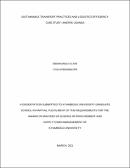| dc.description.abstract | This study sought to determine the effect of sustainable transport practices on logistics efficiency in the context of Maersk Uganda. The study was guided by the theory of constraints and focused on addressing three objectives which included; to determine the effect of Eco-driving training practice on the logistics efficiency of Maersk, to assess the effect of telematics on the logistics efficiency of Maersk and to examine the effect of stakeholder engagement on the logistics efficiency of Maersk. The study adopted a case study research design and a sample of 48 staff was considered for the survey. The study used questionnaire and interview methods of data collection and data was analysed using descriptive analysis and regression statistics with help of SPSS 23.0. Descriptive statistics were used to describe the response rate, respondent’s characteristics and characteristics of Maersk while regression analysis was used to establish the direct effect of eco-driving training practice, telematics and stakeholder engagement on the logistics efficiency. The study found out that eco-driving training has a significant effect on logistics efficiency of Maersk (r = 0.292 and PValue<0.05). The study also found out that telematics adoption has a significant effect on the logistics efficiency of Maersk (r = 0.496 and PValue<0.01). Furthermore, the study also established that stakeholder engagement has a significant effect on logistics efficiency of Maersk (r = 0.320 and PValue<0.05). The study therefore concluded that when Maersk drivers and staff are equipped with all eco-driving techniques and they understand them well, it will increase logistics efficiency of Maersk. It was further concluded that Maersk should focus in details on the use of telematics because through telematics, Maersk can be able to monitor its vehicles on the road and also behaviours of their drivers while driving which helps to reduce on accidents, pollution and fuel consumption thus improvement in logistics efficiency. With regards to stakeholder engagement on logistics efficiency, it was concluded that stakeholders should be involved in decision making concerning sustainable transport thus improving logistics efficiency of Maersk. The study recommended that Maersk should improve on equipping and testing all its drivers with up-to-date eco-driving practices. It further recommended Maersk to adapt to Journey management technology and also upgrade its telematics system to 5G network. Lastly the study recommended Maersk to use social media networking and Online collaborative platforms to enable interactions among all stakeholders thus improvement in stakeholder engagement in decision making concerning sustainable transport of Maersk. | en_US |

